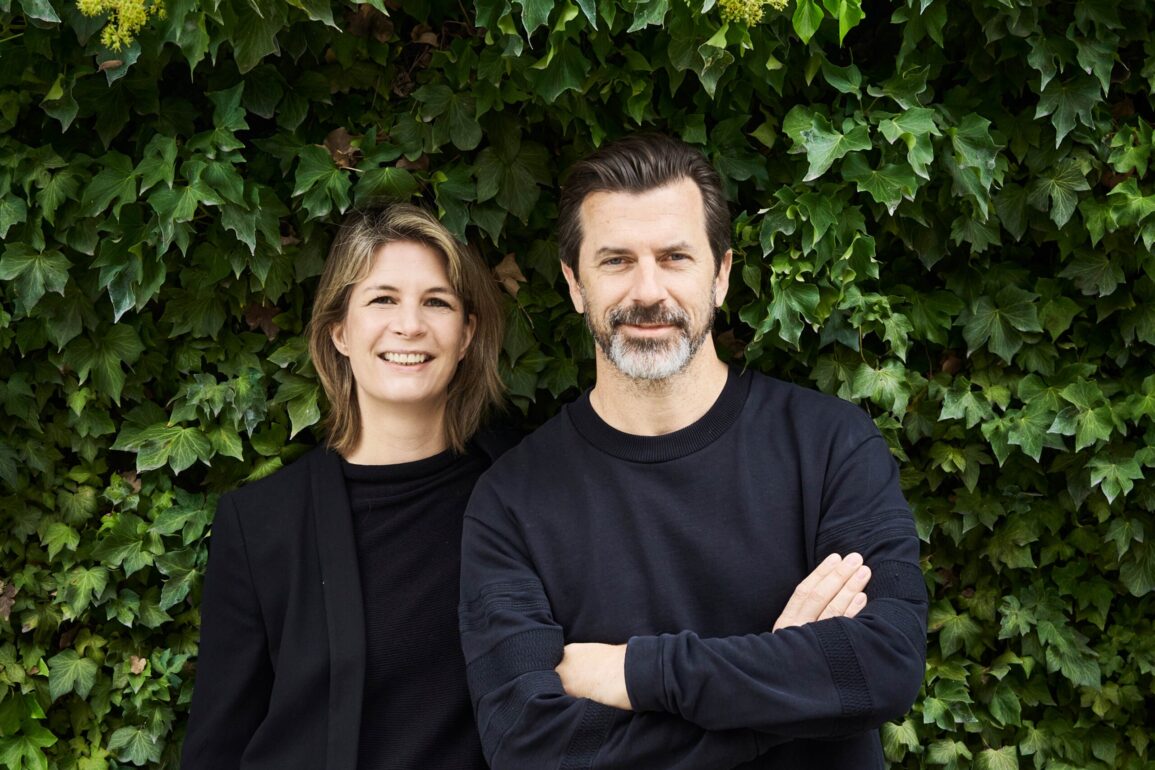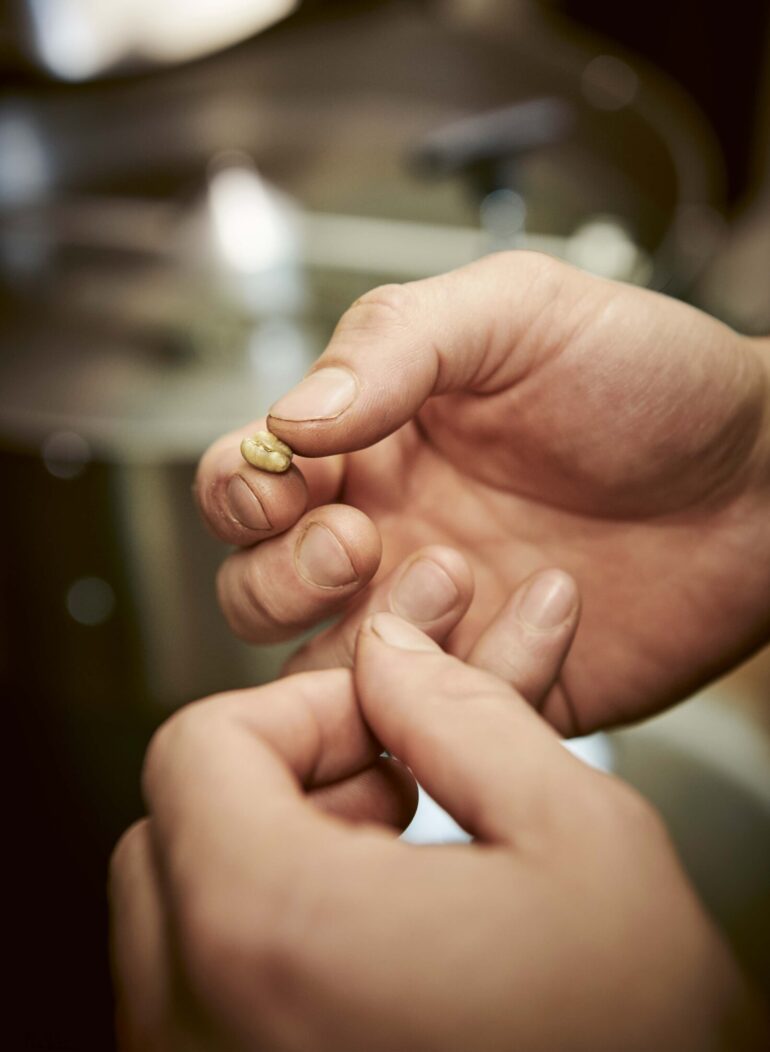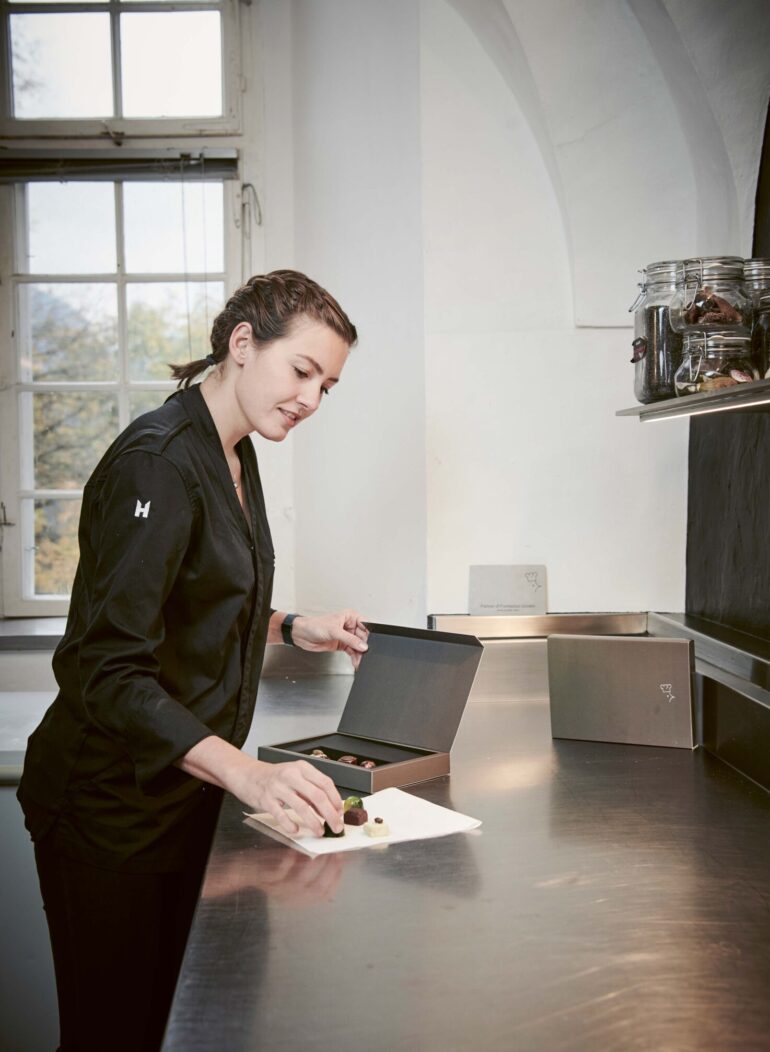Sarah and Andreas Caminada are the founders of Fundaziun Uccelin. Andreas, a celebrity chef, and Sarah, the charity’s managing director, want to support young people with a 20-week programme and pass on their enthusiasm for the restaurant world. To kick things off, each of the graduates spend a week at Andreas Caminada’s restaurant, housed within Schloss Schauenstein in Fürstenau, in the canton of Grisons.
What motivated you to set up Fundaziun Uccelin?
Andreas Caminada: Our business here at the castle was going well. That’s why we wanted to give something back after all these years. We thought about raising money and supporting a charity, and ideas just started flying back and forth between Sarah and me.
Sarah Caminada: The business had grown significantly. Andreas started with four employees, and now we’ve got 70 at the castle and at Casa Caminada. It makes us happy, and we want to pass on this joy and knowledge.
AC: After a good deal of reflection, we decided to develop something new, something that hadn’t existed before. And we wanted to set an example for our industry: we can use our charity to nudge things in a positive direction. There are similar funding programmes in the fields of art and theatre, so we wanted our industry to benefit from this opportunity, too. I told Sarah that we had to do it! (laughs)
SC: Somehow, we just knew we wanted to do something for young people. We receive 30 to 40 applications for placements every week. Every young chef would love to shadow us, but we have to turn many of them down.
TP: Why is that?
SC: Under the collective bargaining agreement, we need to pay everyone who works for us, and we wouldn’t be able to finance more than one of these positions. It’s a shame, because we receive a lot of great, interesting CVs from young applicants, and we’d love to help open up opportunities for them.
TP: And that’s how the idea of the foundation came about?
SC: To us, a foundation seemed to be the most solid basis.
AC: Exactly. We set up the foundation privately. We deliberately ensured that its offering was separate from our business: we didn’t want people to suggest that Caminada was just training up his own staff. Of more than 25 graduates, only two wanted to work with us, with the others working elsewhere.
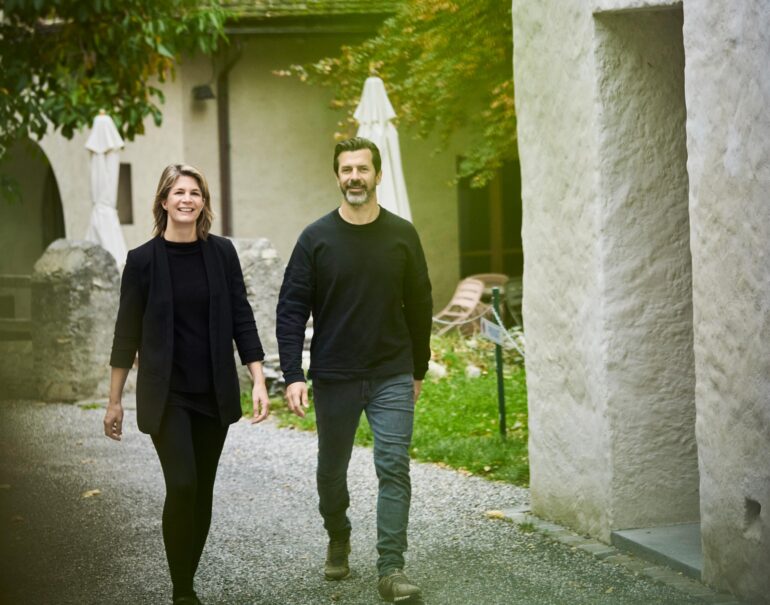
TP: How did the idea take shape?
SC: We created a 20-week programme, divided into various placements. Some involve shadowing national or international chefs, and others are with producers.
AC: We used our network to find businesses, telling them what we wanted to do and what we expected from them.
SC: The aim is for them to train young people, take them on, and give them an insight into what they do. Because another issue is that trainees often end up in the production kitchen, where they’ll spend all their time chopping onions…
AC: …picking herbs…
SC: …peeling carrots. Exactly. But that’s not the point of our programme. We want our scholarship holders to learn their craft. Of course, some head chefs do send programme participants to the production kitchen to start with. That’s ok; it means that the scholarship holders need to show what they can do, to start with. They need a certain level of skill, but experience has shown that after two weeks, at most, they’ve proven themselves capable of handling other tasks.
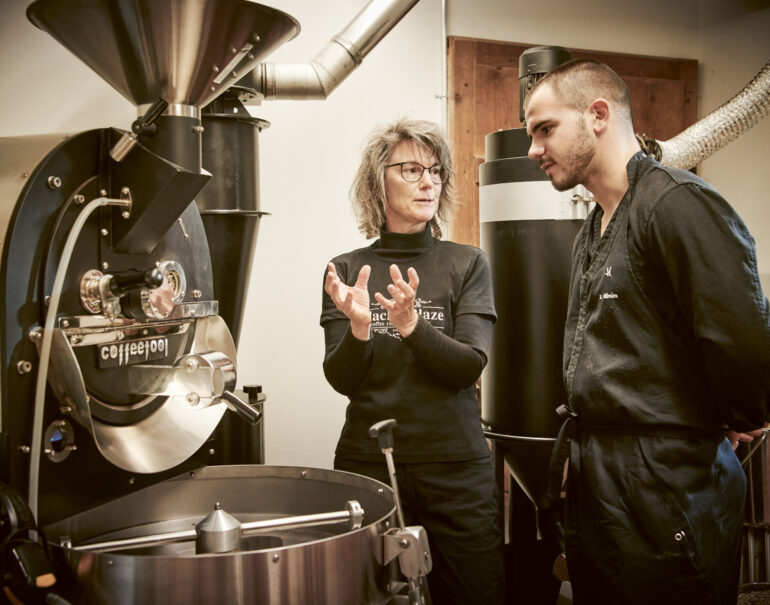
TP: What role does discipline play?
SC: The programme isn’t a free pass. It’s not like going on a jolly – the young people involved actually have to do work.
AC: The scholarship holders should be part of the action, during service, when the guests are there, feel the hustle and bustle.
TP: How did the programme get started?
AC: We set up the foundation in 2015. We wanted to start slowly by posting the advert and seeing with our own eyes who applied: we received 50 to 60 applications.
SC: When they register, applicants put together their own 20-week programme. I only offer advice if someone just picks businesses in northern Europe, for example, or opts for a similar cuisine across all their placements. In this case, I suggest that it might be good to pick a business in the south, or seek out somewhere offering classic French cuisine, for example. I provide input, but they make the decision. Today, participants often say that they love being at the oyster farm, and then head to a chocolatier for their next placement. It’s these contrasts that are fascinating.
AC: They can also go and shadow a butcher or a cheesemaker, take a sensory course, or go hunting for truffles.
SC: We chose three scholarship holders in the first round.
AC: These three started the programme in 2016, and we gained the necessary experience to determine whether or not our idea worked. For example, how things played out in terms of visas when someone went to New York.
TP: Why this restrained approach?
SC: If it had proved impossible to go to the USA, say, we would have had to adjust the programme accordingly. We felt it was important to grow sustainably, not quickly.
AC: What we realised is that we needed to go a step further. Scholarship holders now receive a book of values from us, detailing exactly what we expect from them. At the start of the programme, every single one of them comes to join us at the castle for a week. If we notice that someone isn’t motivated, we can then remove them from the programme at that point.
SC: To date, this hasn’t happened, fortunately. And eight scholarship holders took part in the second round.
TP: How is the programme organised?
SC: Once they’ve chosen a programme, the scholarship holders always receive an entire package. It’s like an around-the-world trip. They receive a programme…
AC: … flight tickets…
SC: … contact information for the people they need to get in touch with…
AC: … pocket money, insurance…
SC: … everything they could need.
TP: Uccelin pays for the whole thing. What does a programme cost?
AC: It costs the charity around 15,000 Swiss francs per person.
TP: And how does the charity finance itself?
AC: As a foundation, Uccelin is not endowed with its own assets. It finances itself from ongoing operations, with all the menus in our restaurants donating two Swiss francs to the charity. When I take part in a symposium, the event organiser makes a contribution to the charity. We also put on charity galas.
TP: What does that mean?
AC: We organise a small-scale event here in the castle, with no more than 40 guests. They pay 800 Swiss francs for the culinary evening, with all the money going to the charity. That puts us on a solid footing. In Zurich, we even once put on a Culinary Cinema Nights event over three days. It was a roaring success, but a lot of work, too.
SC: We also receive support from major donors.
AC: We have one donor who thinks that what we do is just great. He himself earned his money in our industry, and he loved the sustainability of our approach.
SC: This support is wonderful. At the start, I felt uncomfortable showcasing our charity at an event when someone else at the same event was presenting a project about hunger.
AC: We sensed that the people who support us are looking for precisely that.
SC: I think our project wins people over because they can see the faces behind it.
AC: We can sense that we’ve laid the foundations, and people value that. It opens up lots of new opportunities. For example, we’ve developed a collaboration with Smiling Gecko, a charity that works in Cambodia. We’re now offering an additional programme: Uccelin graduates can head to Cambodia for two months after completing their programme and offer assistance to the kitchen and service team at the Smiling Gecko Farm. They give something back, passing on the skills they’ve learned.
’It was important to us to build the program sustainably, not quickly.ʽ
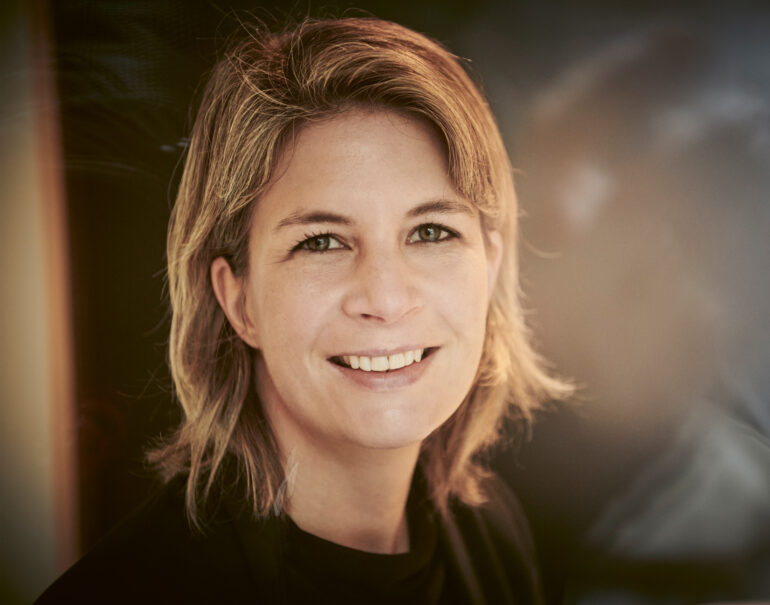
TP: What do graduates benefit from the most?
SC: The programme revolves around three pillars. The first is skills, the second is their network, and the third is the idea of a personal challenge. Over these 20 weeks, they start a new job multiple times, need to learn new names and have to master new challenges.
TP: How has the coronavirus crisis affected you?
SC: We needed to bring all the programme participants home.
TP: They were scattered across the world?
SC: Exactly. We brought them all back. We supported them and got everything organised so they could return to work, ensuring nobody fell off a financial cliff. In the midst of this, two scholarship holders re-started the programme. However, given that the travel restrictions are changing on a weekly basis, it’s clear that they need to be very flexible.
TP: And how did it affect your business itself?
AC: We closed completely for two and a half months.
SC: It was bad, and it was tough. But we had the total support of our employees, all of whom agreed to short-time working arrangements. And when we reopened, there were no discussions about the hygiene measures or the fact that we’re wearing masks, which was great! Everyone agreed that we had to put our foot on the gas, and everyone put in a huge amount of energy.
TP: How did your career get started? Were you also able to benefit from placements?
AC: I completed my apprenticeship in Laax, in a place cooking up homely, rustic cuisine. Then I moved to Vancouver for a year. My host father had previously been a chef, and like a mentor, he showed me a thing or two. He arranged for me to get a look behind the scenes at two restaurants in Vancouver. Those were two incredible days that really opened my eyes.
TP: And today, you take your guests on a sensory journey.
AC: We want our guests to sense that a lot of work and passion goes into it. We want them to dive into an atmosphere that makes them blissfully happy. That includes top-class food, top-class service, architecture… We don’t put on a massive show for them. It’s a very subtle experience, with elements that are in tune with each other. When everything is in harmony, our guests can leave utterly satisfied.
TP: How is everything going to continue in terms of the foundation?
AC: At present, we can only send ten scholarship holders on the programme. In the future, this number could be 100 – if we raise enough money. We don’t just want people from Switzerland to benefit from the programme, and nor should it just be for chefs. It doesn’t have to focus on high-end gastronomy, either. It’s about learning the craft, and that applies to service staff, butchers, etc. SC: We’re also working on an idea for our alumni, which would enable graduates to keep growing their network.
Learn more about the Uccelin Fundaziun on stiftungschweiz.ch

